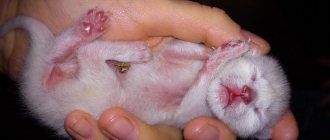Tip #1
If the kitten is very angry, you should try to catch it and pick it up, stroke it and caress it.
At this age, the pet grows and develops; it has a lot of energy that needs to be released. Therefore, it is recommended to spend a lot of time with him: pick him up, play, distract him from pranks. The more you entertain a kitten during the day, the less it will disturb its owner at night, since there will be no energy left for this and its activity will noticeably decrease. You can play especially actively with him a couple of hours before bedtime so that he gets tired. You need to stop playing gradually, making your movements smoother and calmer. If you interrupt it suddenly, the kitten will want to continue and will begin to chase the owner’s legs.
How to determine the cause of screaming
Learn more about kitten development. Kittens go through several stages of growth. Knowing these steps will help you understand why your kitten is eating and calm him down.
There are only three stages:
- From birth to two weeks. Kittens have ears and eyes open. Separating kittens from their mothers and other kittens in the litter can cause behavioral problems.
- 2-7 weeks. The socialization process is in full swing, and the kittens begin to play. Kittens gradually begin to refuse to nurse from their mother cat at 6-7 weeks of age, but may sometimes ask for milk to help calm them down.
- 7-14 weeks. The kitten's communication with other animals improves, and coordination in space increases. Kittens should not be separated from their mother and other kittens in litter for 12 weeks as this increases the risk of behavior problems. Kittens that are held gently for 15-40 minutes a day for the first 7 weeks of life are more intelligent.
Tip #2
If you cannot curb an overly active pet with attention and affection, you will have to be strict. Remember that under no circumstances should you hit a kitten: after just one time, it will remember it and will experience fear and mistrust of its owner, and this is fraught with serious consequences. Due to a constant sense of danger, the animal may experience mental disorders that will make it inadequate.
In addition, cats are very vindictive. Therefore, being strict with a kitten means a gentle click on the nose or a splash of water from a spray bottle. Another method is to lightly grab him by the scruff of the neck, as his mother did with the kitten recently. But all this needs to be done only at the moment of prank: cats have a very short memory, and within a few minutes after the prank the animal will not understand why the owner is doing this to him.
How to calm a crying kitten
Understanding your kitten's developmental and nutritional needs during the first months of life will help determine the cause of its plaintive meowing. Here are the common causes of meowing in kittens of different ages and ways to calm your baby:
Newborn kittens up to 8 weeks
Kittens are born deaf and blind. During the first weeks of life, they cry or meow for food and warmth, according to the ASPCA. Until 8 weeks of age, kittens usually stay with their mothers so that they can feed and care for them. The weaning process usually begins at around 4 weeks and lasts 4–6 weeks. When weaning from the mother's breast, the baby may meow because the mother is not around to feed him. If the kitten is less than 8 weeks old and there is no mother cat nearby, you need to come to his aid.
How to help: Don't feed your kitten cow's milk, says Best Friends Animal Society. For this purpose, there are mixtures designed specifically for kittens. Best Friends also advises keeping babies under 4 weeks old in a cat carrier with plenty of blankets, towels or a heating pad to keep them warm.
From 8 weeks to 6 months
A kitten's baby teeth will erupt in about 4–6 weeks, but permanent teeth will begin to replace them after 4–6 months. According to Greencross Vets, teething isn't necessarily painful, but it can cause irritation and sensitivity that may cause your baby to meow. If, in addition to meowing, he has red, swollen gums and discharge, you should immediately consult a veterinarian - the baby may require treatment.
How to help: give the kitten something to chew on. Plastic chew toys that are safe for cats and terry cloths are great for this purpose. This wipe can also be used to gently wipe your kitten's teeth. Such actions will help him get used to the process of brushing his teeth.
From 6 to 12 months
As the kitten approaches adolescence and then adulthood, it begins to calm down and relax. This is when he establishes a regular habit of using the litter box. Aspen Grove Veterinary Care says this is a good time to reconsider your cat's litter box size.
Does your cat meow before, during or after using the litter box? Perhaps he just doesn't like the litter box. But if he meows in the litter box, the first thing you need to do is take him to the veterinarian. The reason for this behavior may be pain during urination and defecation caused by a serious illness.
How to help: make sure that the tray is large enough and that the kitten likes it. Otherwise, you should buy a larger model. Don’t forget to clean the litter box every day and keep the area where it is kept clean and tidy. If your kitten continues to meow or shows signs of anxiety, you should call your veterinarian immediately.
Tip #3
A sharp sound will also help calm the kitten: you can deliberately throw some metal object on the floor so that it falls with a roar. The goal is not to scare the kitten, but to distract him from pranks, redirect his attention and reduce his playful mood.
If this method does not work, you need to stop paying attention to the pet and make it clear that the owner does not like this behavior.
Kitten in a new place
When they take a furry pet into the house, they usually think through the main aspects of keeping it - they purchase a litter tray, a scratching post, and ask more experienced animal breeders in advance what kind of food needs to be prepared and what is better to feed the animal - human or special food.
At the same time, it becomes an absolute surprise for them that the kitten will have to become a “natural mother”, and it will behave accordingly, like a small child. You will have to solve problems of how to calm a kitten if it cries while still on the way to a new place and in the future if it gets angry at night and does not let anyone sleep.
If you indulge your pet in everything and take it into your arms or into your bed at the first sign of distress, then it will “sit on your head”, feel like the master of the house, and when the owner gets tired of this balance of power, a confrontation will begin, and you will have to part with the animal.
When adapting an animal to a new place, it is necessary to immediately determine the boundaries of what is permitted and let the kitten understand “who’s boss.”
Tip #4
To make the educational process more effective, you can reward the kitten for good behavior. For example, when he stopped meowing loudly, at the request of the owner, got off the curtain, and stopped playing too rough, he should be praised and treated to his favorite delicacies.
But there must be consistency here: you should not overpraise your pet or do it too often, otherwise he will try to receive encouragement as often as possible.
Hurry up, choose a box and find out what gift awaits you
Discount on pet insurance
Promo code copied to clipboard
Too active cat, a question for you?!
what a horror))) does this mean that it will now be impossible to sleep at night at all?))) I hope she outgrows
everything. Everything will be fine. Our kittens also pranced around 23 hours a day, then gradually they began to understand what kind of routine we had - we need to sleep at night. Now they sleep at night, although they wake up early - at 5 am. They play, jump, stomp like elephants))
And your cat will gradually adapt to your schedule.
Don't worry, this is the most standard behavior for a kitten of this age))
You just have to be patient and get through the next six months. At first, of course, it’s a little hard, but she will gradually grow and become calmer, and then, from 7-9 months (depending on temperament), her schedule will gradually begin to shift from increased activity towards sleep and napping) An adult cat sleeps/naps/rolls around 20 -22 hours a day)
When my older cat was small, I sometimes had to get up at 5 am to play with her. She had a strict schedule - 4 hours of sleep, 1 hour of active play. At the same time, the day-night shift didn’t bother her at all) We played from 12 to 1 am, then she slept, at 5 am she started yelling under the bedroom door (we didn’t let her in then), I got up and played with her for 20-30 minutes to make her calm down.
Now this has long been an adult fat sausage, which sleeps all night next to my pillow, carefully folding its tail on my face))) or on my legs. And he yawns extremely dissatisfied in the morning, trying to explain that if I have to get up for work, this is absolutely no reason to bother the cat and disturb her royal sleep!)))
A very active and playful kitten - why is he running around like crazy?
If you've cared for a kitten, you might think this tiny little furball has two personalities. One of them is a shy, sweet and loving pet that purrs and rests next to you on the couch. But the second one is a hyperactive domestic animal. However, sooner or later this passes, and the kitten grows into an adult cat with its own individual character.
What to do with an overly active cat?
The moment a cat appeared in your house, everything that could be broken, torn or eaten disappeared from it.
Spartan order reigns in the apartment, but the “fluffy vandal” still burns with an insatiable thirst for activity and is looking for the next opportunity to cause mischief.
How can you explain your pet's restless behavior?
1. Youth. Some cats need to grow up and settle down.
2. Change of environment (moving, renovation). Each four-legged pet reacts in its own way to unfamiliar smells, new furniture, street noise coming from behind the door of a new apartment, and so on.
Features of the use of sedatives
Often, taking sedatives is a way to normalize a cat’s condition in the period before castration, a long trip, a visit to a veterinary clinic, or home renovations.
Sedative drugs have two types of action: cumulative and immediate. In the first case, you should start giving them to the animal 10-14 days before the expected event.
Often taking sedatives is a good way to normalize a cat’s condition.
Instant-acting drugs act quickly, but are harmful to the body; such drugs should not be used too often.
Popular herbal preparations:
Chemical sedatives:
Important! Before using any sedatives, consult a veterinarian.
Play soothing music
Often, kittens may behave hyperactively as a result of uncertainty or fear, which may be caused by being in a new home, sharing that new home with strange new cats and people, or other stimulants in the environment.
Once you've given your kitten a safe place, try playing music at a low volume. Choose soft music, instrumental or classical music, as it will calm your kitty's nerves just as music calms yours.
Reasons: why is the baby too active?
Non-pathological factors
Kittens are characterized by playfulness and mobility, which alternates with prolonged sleep. However, there are reasons that increase the baby’s activity. These factors include:
While the fluffy is still small, mobility should be inherent in it.
- Change of scenery. If the baby is taken away from its mother and brought to a new room, the kitten is bombarded with new smells and sounds that the little cat is not yet accustomed to. He rushes around the room, meows, experiences stress, and his nose even gets dry. Moving overstimulates the nervous system, so the kitten may run and jump a lot for several days.
- Young age. A playful kitten is the normal state of a baby. As the cat gets older, it will become reserved.
- Excessive severity of the owner. If the baby is often shouted at and punished, the small cat’s active actions are a kind of protest and response to the owner’s behavior.
- Frequently being left alone. If the baby does not have toys, in the absence of the owner, the kitten itself finds fun from furnishings, throwing off and rolling everything it finds on the floor.
Return to contents
Features of temperament
There are choleric cats among cats. These are the most active and mobile representatives of all types of character. Such a pet grows up too playful and active, and shows emotions violently. During outdoor games, the kitten sometimes becomes aggressive, biting and scratching. Choleric cats are emotional, often using their teeth and claws if something does not suit them. They sleep little and love to be the center of attention. Also, a change in mood quickly occurs and the pet becomes very affectionate.
Activity as a symptom of disease
Lack of microelements
If a small cat is too active, this may be a manifestation of an unbalanced diet, when it does not receive all the necessary nutrients, and behavioral deviations develop. Most often, hyperactivity is provoked by a lack of thiamine (vitamin B1), which has a positive effect on the nervous system and is responsible for adequate behavior and a healthy psyche. The baby also becomes hyperactive due to a lack of taurine, which is manifested by excessive nervous excitability, aggression, inexplicable anger, superficial and anxious sleep.
Hyperthyroidism
It is characterized by excessive production of thyroid hormones - triiodothyronine and thyroxine. Most often, older cats suffer from the disease, but in rare cases the disease is congenital. Immediately after birth, the disease does not manifest itself in any way. One of the symptoms of the pathology is dwarfism. Associated symptoms:
With this disease, the furry may require food more often than expected.
- increased appetite;
- excessive activity;
- weight loss;
- irritability and aggression;
- obsessive meowing, which has not been observed before;
- increased thirst;
- frequent urination;
- dull, matted fur or hair loss;
- vomit;
- intestinal disorder.
Return to contents
Try cat pheromones
Pheromone products for cats, such as diffusers and sprays, contain synthetic pheromones that mimic the pheromones produced by cats. They can be used around your furry friend to reduce stress and anxiety and promote a sense of calm. So it might be worth trying these products if you have a hyperactive kitten.
Just be sure to buy high-quality products from trusted brands and check the ingredient list to avoid unwanted additives such as essential oils that may be harmful to cats.
Posted by Lisa Selvaggio Lisa Selvaggio is a writer who has volunteered in animal rescue, caring for cats of all ages and learning about their many quirks. She is certified in therapeutic pet nutrition and enjoys helping pet parents care for their fur babies.
Source
How to reduce activity?
To calm a small cat that is more than a month old, you should provide it with a variety of toys. Hanging mice, birds, and balls are suitable, which the baby can catch and run after. Such fun should not have sharp elements, the elastic bands are soft, without feathers that the cat can bite off and swallow. Playful kittens should be provided with a high scratching post with holes for climbing. It is advisable for the owner to play with the cat more often, since a running baby quickly runs out of energy and falls asleep.
The owner's gentle stroking will help the baby calm down.
If the baby has become overly excited due to a stressful situation, the owner’s gentle voice and calm stroking will help reduce the tension. Sedatives that are given to the kitten after consultation with a veterinarian are effective. It is important to adjust your diet. The baby should eat high-quality industrial food suitable for age. This diet provides a daily dose of essential microelements. Your doctor will recommend additional vitamin supplements.
If a kitten constantly runs around due to a disruption of the endocrine system, the veterinarian prescribes therapy individually. Sometimes it is necessary to have surgery for excessive growth of thyroid tissue or give your pet medications to normalize hormone levels. Hills Y/D Thyroid Health has released a special dietary dry food for cats suffering from hyperthyroidism. Medical attention is also needed if a hyperactive kitten, who was previously in motion all day, has stopped running and lies down all the time.
Signs of aggression in cats
The reaction to stress manifests itself differently in cats; an inexperienced owner may not immediately recognize fear in the animal’s behavior.
When cats behave nervously:
- lick the skin on one side of the body (one paw, one side);
- calm themselves by making loud purring sounds;
- become completely indifferent to their favorite food or become overly gluttonous;
- They begin to gnaw on various objects and chew indoor flowers.
In case of severe fright due to a loud sound or the appearance of a dog, pets:
- they freeze in place, flattening their ears, tucking their paws and tail under them;
- attempt to escape;
- trying to hide in a dark, secluded place.
During an attack of aggression, small predators begin:
- arching the back to look larger, inflating the tail and hair on the body;
- hiss loudly, snort, howl, showing his teeth;
- look closely at the object that causes aggression;
- rhythmically whip the tail over the body, twitch it;
- hit an approaching object with the front paws with claws extended.
If a panic reaction occurs (if the cat was unable to hide or protect itself), the animal experiences:
- copious flow of saliva, similar to foam;
- loud scream, heartbreaking meow;
- involuntary urination.
Hyperactivity symptoms, diagnosis and treatment
Hyperactivity is not a character trait of an animal, but a form of behavioral disorder. A pet that:
- Most of the day he is in an excited, very active state.
- Has no need to rest at all or does it too rarely. These cats have a disrupted daily routine. If healthy pets sleep at night, like their owners, then overactive cats, even at this time, are full of energy and cannot calm down.
- Unable to concentrate on anything. While a healthy animal can be captivated by play, an overly active one cannot play for more than a couple of minutes. It immediately goes off somewhere, losing interest in the activity.
- Shows unreasonable anxiety.
- He doesn't eat well.
Cats with this disorder may show unmotivated aggression, attack the inhabitants of the home and bite, twitch their limbs or other parts of the body, and meow constantly. They do not perceive the simplest commands that their healthy counterparts perform.
To make a diagnosis, the veterinarian does not always have enough information from the owner of the four-legged patient about the characteristics of his behavior. Examinations may be required, the results of which will help to understand what exactly led to the development of hyperactivity - micronutrient deficiency (for example, thiamine), hyperthyroidism, head injury, congenital or acquired neurological disorders, stress, etc. Diagnostic methods depend on the specific case. This could be a blood test, MRI, ultrasound, x-ray.
The treatment plan is developed depending on the type of underlying disease that led to the occurrence of this problem. Some cats may be prescribed vitamin complexes and sedatives, while others may require more serious therapy, including surgery.
How to trim your nails calmly
There is the simplest way to calm a cat before trimming its claws: you need to attach a pair of clothespins (with weak compression force) to the scruff of the neck.
You need to prepare in advance for a long trip by train, car or flight.
This is where psychology comes into play; in childhood, a cat carries a kitten, holding this place with its teeth; if there is compression in the nape area, the animal instinctively calms down and relaxes.
Try puzzle toys
Puzzle toys are a great way for kittens to get exercise, but they will also get a mental workout. With these toys, you can strategically hide treats so your pet will have to work a little to figure out how to get to them. Additionally, this type of toy can attract the attention of your hyperactive kitty, and once he smells the treats inside, he will need to use his energy to solve the mystery and get to those tasty treats.
There are many different puzzle toys to choose from, so you can find several that are sure to keep your energetic fur baby entertained while he "hunts" for his "prey." And after she's done hunting for treats, your kitten might even be ready to take a nap.











